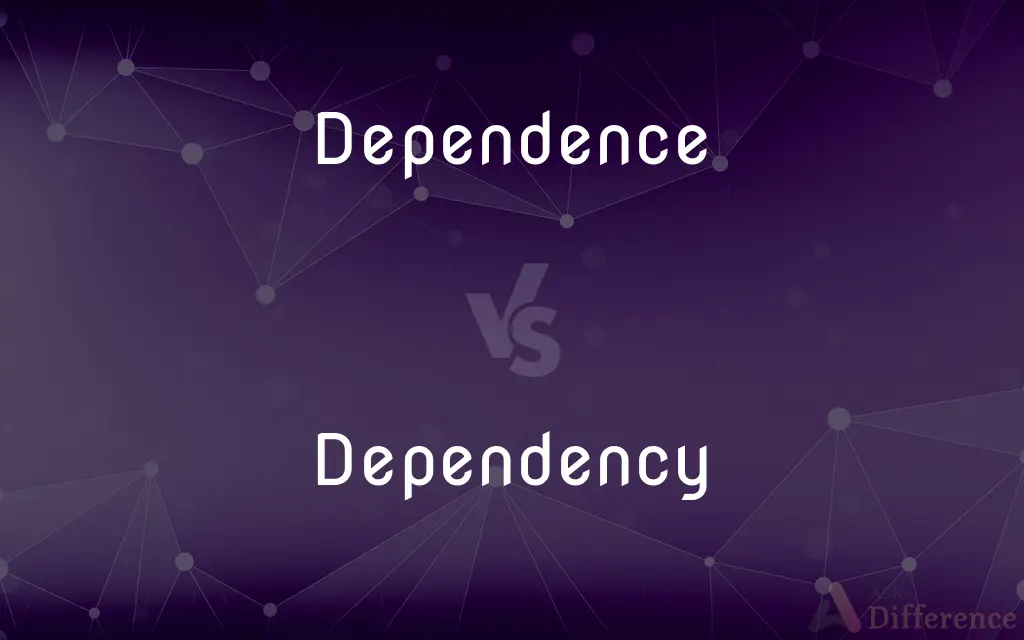Dependence vs. Dependency — What's the Difference?
By Urooj Arif & Fiza Rafique — Updated on March 7, 2024
Dependence refers to a state of relying on or needing something for support, while dependency often denotes a political or geographical area reliant on a larger entity.

Difference Between Dependence and Dependency
Table of Contents
ADVERTISEMENT
Key Differences
Dependence is a broad term that can apply to various contexts, including psychological, physical, or emotional reliance on substances, individuals, or systems. On the other hand, dependency typically describes a geopolitical relationship where a territory is governed by or politically supported by a more powerful country.
While dependence can denote a necessary reliance that might be part of a healthy dynamic, such as in interdependent relationships, it can also imply an unhealthy or compulsive need, as seen in substance dependence. Conversely, dependency in a geopolitical sense often carries implications of economic, political, or administrative subordination.
The concept of dependence is central in fields like psychology, where it might describe behaviors or conditions such as addiction or co-dependence, emphasizing the aspect of reliance that might lead to negative consequences. Dependency, when used in a political context, highlights the nature of the relationship between territories, often focusing on aspects of governance, autonomy, and economic relations.
In discussions around social and health policy, dependence may refer to the reliance on welfare systems or medical treatments, underscoring the aspect of necessity and support. Dependency, when referring to territories, often becomes a subject of international law and relations, with debates focusing on self-governance, independence, and the rights of peoples.
Understanding the nuances between dependence and dependency is crucial for clear communication, especially in professional and academic contexts where the precision of terms can significantly impact the interpretation and implications of discussions and policies.
ADVERTISEMENT
Comparison Chart
Definition
A state of relying on something for support.
A geopolitical relationship of reliance.
Context
Can be psychological, physical, or emotional.
Often political or geographical.
Implications
Can be positive (interdependence) or negative (addiction).
Suggests subordination or support by a larger entity.
Key Fields
Psychology, health, social policy.
Political science, international law.
Examples
Substance dependence, dependence on technology.
Colonies, territories with limited self-governance.
Compare with Definitions
Dependence
Emotional or psychological reliance on others.
Therapy can address issues of emotional dependence in relationships.
Dependency
Territories governed by a foreign power.
Several small islands remain as dependencies of European nations.
Dependence
Increasing reliance on digital devices.
Modern society exhibits a significant dependence on smartphones for daily tasks.
Dependency
Economic support from a dominant country.
Some dependencies rely heavily on financial aid from their governing countries.
Dependence
Physical or psychological need for a drug.
Alcohol dependence is characterized by a strong craving and inability to stop usage despite adverse effects.
Dependency
Specific international law recognition.
The legal status of dependencies is often a matter of international debate and agreements.
Dependence
Dependence on certain industries or resources.
Some countries have a high dependence on tourism for their economy.
Dependency
Lack of full sovereignty in governance.
Dependencies often have limited autonomy in their internal affairs.
Dependence
Relying on external aids or services.
Many elderly individuals show a growing dependence on home care services.
Dependency
Military or strategic value to the dominant country.
Some dependencies hold strategic military bases for their governing countries.
Dependence
The state of being determined, influenced, or controlled by something else
The economy's dependence on oil.
Dependency
A country or province controlled by another
The islands became dependencies of Norway and Denmark
Dependence
The state of being dependent on another for financial support.
Dependency
Dependence
The country's dependency on the oil industry
Dependence
The condition of being dependent on a substance such as a drug or on a given behavior
Alcohol dependence.
Gambling dependence.
Dependency
Dependence.
Dependence
(Archaic) Trust; reliance.
Dependency
Something dependent or subordinate.
Dependence
The state of being dependent, of relying upon another.
He had a deep dependence on her for guidance.
Dependency
A minor territory under the jurisdiction of a government.
Dependence
An irresistible physical or psychological need, especially for a chemical substance.
Her dependence on cocaine led to her ruin.
Dependency
A state of dependence; a refusal to exercise initiative.
Frank's sullen dependency was driving his father nuts.
Dependence
The act or state of depending; state of being dependent; a hanging down or from; suspension from a support.
Dependency
Something dependent on, or subordinate to, something else:
In the United States' governmental structure, the military is conceived as a dependency under the executive branch.
Dependence
The state of being influenced and determined by something; subjection (as of an effect to its cause).
The cause of effects, and the dependence of one thing upon another.
Dependency
A colony, or a territory subject to rule by an external power.
Dependence
Mutual connection and support; concatenation; systematic inter-relation.
So dark and so intricate of purpose, without any dependence or order.
Dependency
A dependence on a habit-forming substance such as a drug or alcohol.
Dependence
Subjection to the direction or disposal of another; inability to help or provide for one's self; a lack of independence or self-sufficiency.
Reduced to a servile dependence on their mercy.
Dependency
(computing) Reliance on the functionality provided by some other, external component.
This library has dependencies on a lot of other libraries. We have to compile all of those other libraries first.
Dependence
A resting with confidence; reliance; trust.
Affectionate dependence on the Creator is the spiritual life of the soul.
Dependency
(computing) An external component whose functionality is relied on.
One of this library's dependencies is very finicky. It can be hard to get it to compile on some systems.
Dependence
That on which one depends or relies; as, he was her sole dependence.
Dependency
State of being dependent; dependence; state of being subordinate; subordination; concatenation; connection; reliance; trust.
Any long series of action, the parts of which have very much dependency each on the other.
So that they may acknowledge their dependency on the crown of England.
Dependence
That which depends; anything dependent or suspended; anything attached a subordinate to, or contingent on, something else.
Like a large cluster of black grapes they showAnd make a large dependence from the bough.
Dependency
A thing hanging down; a dependence.
Dependence
A matter depending, or in suspense, and still to be determined; ground of controversy or quarrel.
To go on now with my first dependence.
Dependency
That which is attached to something else as its consequence, subordinate, satellite, and the like.
This earth and its dependencies.
Modes I call such complex ideas which . . . are considered as dependencies on or affections of substances.
Dependence
Lack of independence or self-sufficiency
Dependency
A territory remote from the kingdom or state to which it belongs, but subject to its dominion; a colony; as, Great Britain has its dependencies in Asia, Africa, and America.
Dependence
Being abnormally tolerant to and dependent on something that is psychologically or physically habit-forming (especially alcohol or narcotic drugs)
Dependency
Lack of independence or self-sufficiency
Dependency
Being abnormally tolerant to and dependent on something that is psychologically or physically habit-forming (especially alcohol or narcotic drugs)
Dependency
A geographical area politically controlled by a distant country
Common Curiosities
How is dependency different from dependence?
Dependency is commonly used to describe geopolitical relationships where a territory is under the governance or influence of a more powerful entity, unlike the broader concept of dependence.
What does dependence mean in a psychological context?
In psychology, dependence often refers to an individual's emotional or psychological reliance on something or someone, which can range from healthy interdependence to unhealthy addiction.
Can a person be dependent on technology?
Yes, individuals can exhibit a dependence on technology, characterized by a reliance on digital devices for everyday activities and interactions.
How does economic dependence affect countries?
Economic dependence on a particular sector or resource can make countries vulnerable to market fluctuations, impacting their overall stability and growth.
Can dependence be positive?
Yes, dependence can be positive in the context of interdependent relationships where parties mutually support and rely on each other in healthy ways.
Is dependence on substances always harmful?
While not all substance use is harmful, dependence is characterized by a compulsive need that typically has negative health, social, and personal consequences.
How do dependencies become independent?
Dependencies can gain independence through legal processes, negotiations, or referendums that lead to sovereignty and self-governance.
What is an example of a political dependency?
An example would be a territory that lacks full sovereignty and is governed or administered by a larger country, such as the relationship between a colony and its colonial power.
What legal rights do dependencies have?
The legal rights of dependencies vary widely and depend on international agreements and the laws of the governing country.
What are the psychological effects of dependence in relationships?
Psychological dependence in relationships can lead to issues such as co-dependence, where individuals rely excessively on each other for emotional support, often to an unhealthy degree.
How do countries manage economic dependence on a single industry?
Countries manage economic dependence by diversifying their economies, investing in different sectors, and developing policies that reduce vulnerability to market changes.
How does technology dependence impact society?
Dependence on technology can have both positive effects, such as increased connectivity and access to information, and negative impacts, such as reduced face-to-face interactions and privacy concerns.
What is the historical context of political dependencies?
Many political dependencies originated from colonial empires, where territories were governed by foreign powers, with varying degrees of autonomy and governance over time.
What role do international organizations play in dependencies?
International organizations can provide oversight, support, and mediation in matters concerning dependencies, particularly regarding human rights and self-determination.
Can dependence on welfare systems be reduced?
Yes, through policy reforms, economic development, and support services, dependence on welfare systems can be reduced by addressing underlying causes.
Share Your Discovery

Previous Comparison
Coffin vs. Sarcophagus
Next Comparison
Employ vs. HireAuthor Spotlight
Written by
Urooj ArifUrooj is a skilled content writer at Ask Difference, known for her exceptional ability to simplify complex topics into engaging and informative content. With a passion for research and a flair for clear, concise writing, she consistently delivers articles that resonate with our diverse audience.
Co-written by
Fiza RafiqueFiza Rafique is a skilled content writer at AskDifference.com, where she meticulously refines and enhances written pieces. Drawing from her vast editorial expertise, Fiza ensures clarity, accuracy, and precision in every article. Passionate about language, she continually seeks to elevate the quality of content for readers worldwide.














































